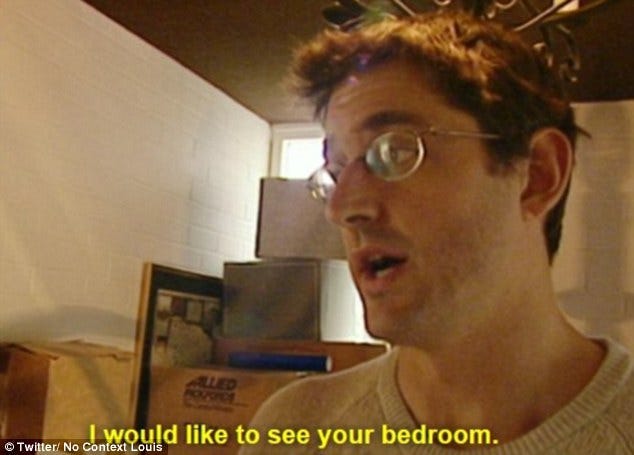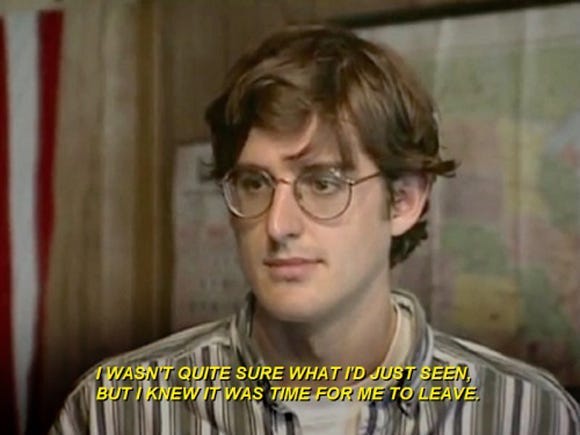Level up your user interviews: lessons from the master, Louis Theroux
Interview and question techniques for UX researchers
Interview and question techniques for UX researchers
So it seems I have a thing for documentarians. If I ever have a celebrity crush, it’s on a geeky dude bumbling around the world talking to people on camera. I’m talking John Safran, Adam Richman, Louis Theroux. Sure, part of it is that I think they’re cute, but I think part of it is I want to be them.
It’s a beautiful thing to meet someone new, and just connect with them in the right way so as to get to that moment. When suddenly they’re telling you all sorts of things they never planned to and you’re looking right into what the world is like for this other being walking around on the same patch of dirt as you.
In the last month, I made a study of everything Louis. I binged on all his phases - from the gangly guy in the 90s being scarred by sex parties, to someone who can walk into the world’s worst prison and casually ask a prisoner personal questions like they’re having a chat over coffee. Louis is kinda my hero. I try to be like him. In conversations with my friends, when I meet new people, and especially in user interviews.
Louis is an absolute master of the interview. Seriously, this guy can ask anyone anything. Remember when he rocked up to the Nazis house? Within a few sentences, he was saying to him, "the neighbours said you’re scary. Are you scary?" And the Nazi guy just laughed!
So what can we humble researchers learn from the master? Well, here’s a few things I have noticed that he does so well.
He gets on their level.
He mirrors, he validates, he treats them as equals. He uses their language, and asks them to teach him things as they would a new member of their scene. He literally gets into their world, and tries to experience it from within.
Even if he’s uncomfortable, people open up to him because he’s open to learning about them. He doesn’t act like a researcher looking down from above — he’s right in there, naked in the hot tub.
How can researchers use this technique?
Mirror the interviewee. Mirror their energy, mirror their body language, use the phrases and terminologies they use. That might mean using the ‘wrong’ word for some tech stuff but just roll with it.
Get in the user’s world, by doing as much immersive shadowing and contextual enquiry as you can. Try to understand their world from within. Feel like a brand new member of their world. Ask to be taught.
He’s friendly.
And what I mean by friendly is that he treats them as a friend. He doesn’t hold himself back behind cool professionalism. He gently ribs them if they say something dumb, he pushes back sometimes if he wonders if they really mean what they say. He jokes around with them like he’s known them for years. That kind of rapport, where someone feels like they’re friends with you, is irreplaceable.
What he’s trying to do, making a documentary, is get people to open up and tell him about their lives, their inner feelings and truths — they’re not going to do that if they don’t feel like they’re talking to someone who cares.
How can researchers use this technique?
Ditch the pre-planned questions, for goodness sake. Have a conversation with this person. Be nice to them! Make them a coffee. Ask them how their day’s been.
Be friendly. Can I say it again? Be friendly. Like them. Show them you like them.
He never judges.
Louis is my hero because he’s so entirely, so completely un-judgemental. And I don’t believe he’s acting un-judgemental. I think he actually doesn’t judge them. He’s here to learn, not to judge.
He doesn’t lay his own expectations or experiences over theirs. He’s open to hearing and learning about this person in front of him, without expectation. That is golden. That is kind of the key to human relationships, in my opinion. But it also definitely helps with research.
How can researchers use this technique?
Be aware that your expectations colour how you see every person in this world. Try to take each new person as a new experience, without letting your preconceptions cloud how much of what they say you actually hear.
Practise your poker face. You really don’t want someone you’re interviewing to see if you’re surprised or shocked or think the 5-step process they use to find the Google homepage is hilarious.
He pushes.
In a loveable kind of way - but he pushes. If they’re not giving him info about the thing he wants to talk about, he’s not afraid to ask again.
The only way he can do this is by establishing rapport beforehand. Pushing is an advanced technique! He can only do this when he’s established that they’re friendly, that he’s open to them, and they’re open to him. Pushing too hard is risky, but it pays off when it works.
How can researchers use this technique?
Use your 5 whys. (Though personally I don’t love the word “why”. It’s too direct. Usually I phrase a “why” more like a “what made you do it that way?” or a “what do you think went into that decision for you?”.) Nevertheless, push for deeper information when something is interesting.
Sometimes towards the end of a usability interview (with interviewees I have good rapport with) I ‘open up the curtain’ and just talk to them like a colleague. I’m totally open about what I’m trying to find out, rather than trying to avoid asking leading questions. Sometimes this leads to really good insights — they start to really engage with the prototype and think about it like they’re designing it for themselves.
So I don’t think I’ll ever be as good as Louis, as much as I wish I was — and I don’t know if I’ll ever get the chance to find myself in the kind of situations he has. But as a researcher and general explorer of people, the more open, bendy and non-judgemental I am, the more I learn about people and the bigger my world gets. It’s pretty magic.
So what’s the takeaway from all this? Well, if you’re a designer or a researcher, or maybe just a person who wants to connect with people better — it’s always a good time to go watch Louis again.
All credit to nocontextlouis for the images. Do yourself a favour and follow them, they’re hilarious.
🦋 say hi on bsky: nicolarushton








